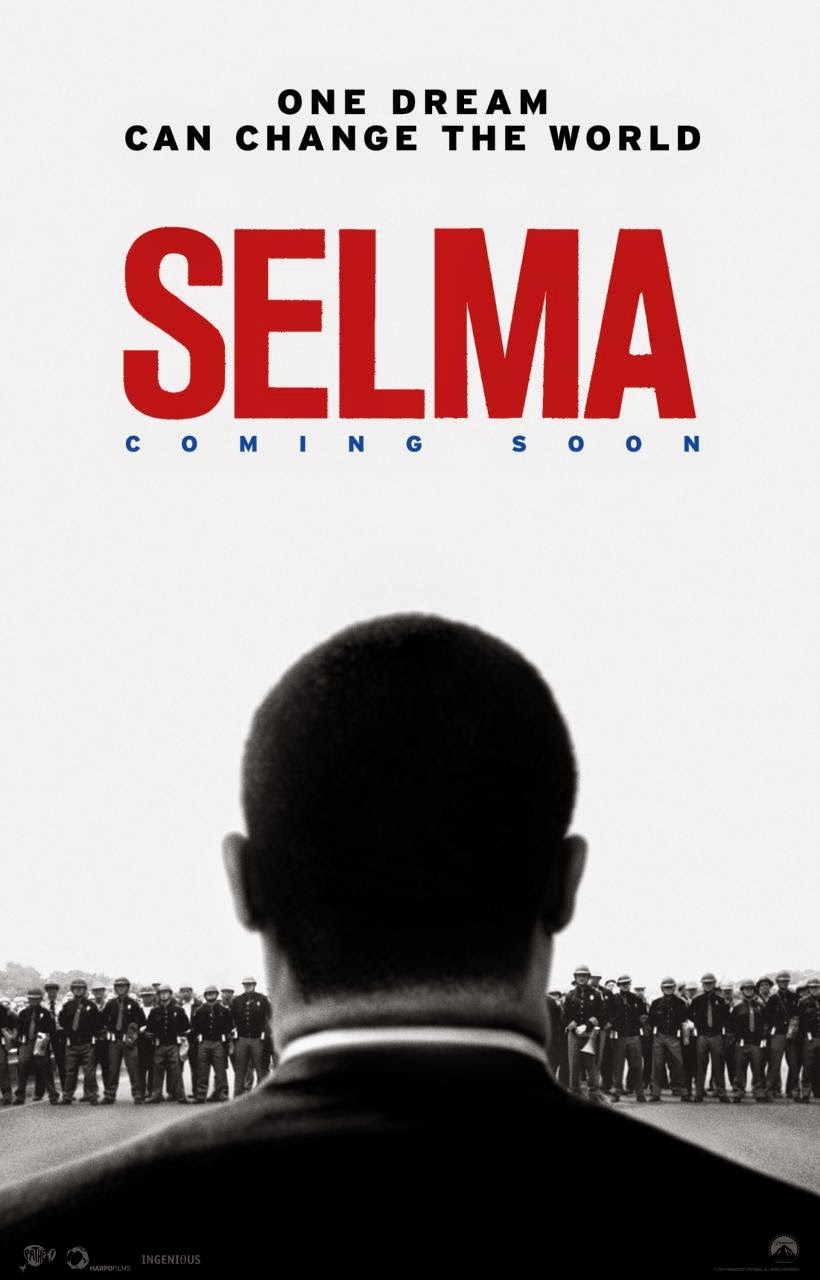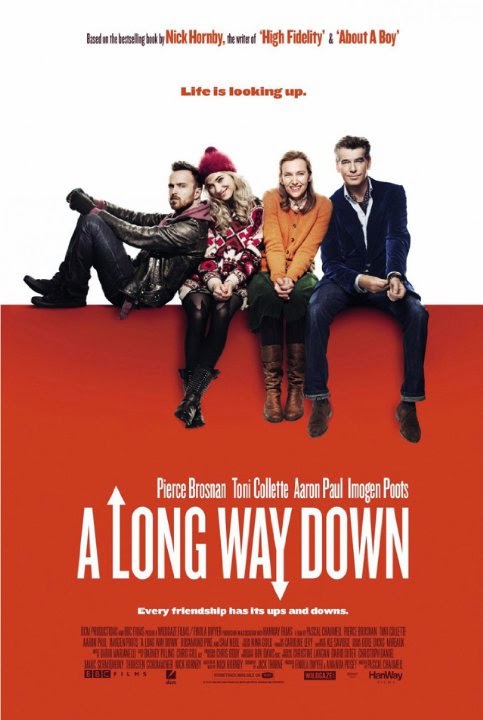March of Greatness
In 2012, Steven Spielberg directed a very powerful film. Lincoln stars Daniel Day-Lewis and Sally
Field as Mr. and Mrs. Abraham Lincoln respectively. The film focuses main
on the final four months of the president’s life and his efforts to pass the
Thirteenth Amendment to the U.S. Constitution. The effort was herald as a brave
step toward civil rights for all Americans no matter their race. Almost a
hundred years after Lincoln’s death, another very important civil rights leader
marched from Selma, Alabama to the state capital in Montgomery. Nominated for
Best Picture, Selma depicts the
struggles Dr. Martin Luther King and many of his supporters faced before taking
that first step in his iconic march.
After receiving the Nobel Peace prize in 1964, Dr. Martin Luther King (David Oyelowo The Butler) has asked the President of the United States Lyndon B. Johnson (Tom Wilkinson Batman Begins)
to create a legislation to take away the restrictions on African-Americans
being able to vote. However, when President Johnson respectively declines and
after a hate crime is committed in Birmingham, AL, Dr. King decides to head to
the small town of Selma to peacefully protest the injustice inflicted upon the
African-American people of Alabama. Things do not go as peacefully as Dr. King
would have hoped. After a few violent reactions by local police and Caucasian
townspeople, Dr. King purposes to march from Selma to Montgomery, Alabama. What
happens is just one of many defining moments of Dr. King’s life and the work he
accomplished while trying to change America forever.
 Since this film’s release, Selma has been met with praise and criticism. The praise is mainly
for the filmmaking aspect of the film, acting, directing, etc. The criticism is
for the historical accuracy of the events and the people that this film
depicts. The criticism makes me sad in a way because shouldn’t we look at the
message of the film and not worry about how mean LBJ was depicted? Of course,
some critics have praised the film for the film’s message. I am one of those
critics. Many films over the last few decades have all shown the bravery of a
couple different civil rights leaders and all of these films have all focused
on the equality of human beings everywhere. Selma,
however, also shows a fragile side to Dr. King. As great as Dr. King was for
this country and every American, Dr. King was also human and fallible. Selma shows the struggles that Dr. King
came face to face with in his ‘professional’ life and his personal life. This
reason alone is why I appreciated this film above all others on this subject
matter. I took many different history classes in high school and now in college
and I understand the importance of what these men did during this very unstable
time in history, but I want a film that is going to show these men as just that…men.
Since this film’s release, Selma has been met with praise and criticism. The praise is mainly
for the filmmaking aspect of the film, acting, directing, etc. The criticism is
for the historical accuracy of the events and the people that this film
depicts. The criticism makes me sad in a way because shouldn’t we look at the
message of the film and not worry about how mean LBJ was depicted? Of course,
some critics have praised the film for the film’s message. I am one of those
critics. Many films over the last few decades have all shown the bravery of a
couple different civil rights leaders and all of these films have all focused
on the equality of human beings everywhere. Selma,
however, also shows a fragile side to Dr. King. As great as Dr. King was for
this country and every American, Dr. King was also human and fallible. Selma shows the struggles that Dr. King
came face to face with in his ‘professional’ life and his personal life. This
reason alone is why I appreciated this film above all others on this subject
matter. I took many different history classes in high school and now in college
and I understand the importance of what these men did during this very unstable
time in history, but I want a film that is going to show these men as just that…men. Dr. King is played astonishingly well by David Oyelowo. I am
not one to speak about the racial aspects of the Academy of Arts and Sciences,
but I will say that Oyelowo was brutally snubbed. The humanity that I spoke of
in the last paragraph would not and could not be achieved without an
outstanding performance and Oyelowo delivers just that. Oyelowo looks and
sounds like Dr. King, but more than that he is able to project the emotional
strain that Dr. King went through at this time. Oyelowo shows that inner
struggle, but like Dr. King, he is able to show a determination to do what was
right. I was also impressed with Carmen
Ejogo (The Purge: Anarchy) who
plays Dr. King’s wife Coretta Scott King.
Ejogo also gives a very humanistic interpretation of Mrs. King and her apprehensions
of her husband’s dangerous work. Ejogo also illustrates the love and support
that Mrs. King had for her husband.
Dr. King is played astonishingly well by David Oyelowo. I am
not one to speak about the racial aspects of the Academy of Arts and Sciences,
but I will say that Oyelowo was brutally snubbed. The humanity that I spoke of
in the last paragraph would not and could not be achieved without an
outstanding performance and Oyelowo delivers just that. Oyelowo looks and
sounds like Dr. King, but more than that he is able to project the emotional
strain that Dr. King went through at this time. Oyelowo shows that inner
struggle, but like Dr. King, he is able to show a determination to do what was
right. I was also impressed with Carmen
Ejogo (The Purge: Anarchy) who
plays Dr. King’s wife Coretta Scott King.
Ejogo also gives a very humanistic interpretation of Mrs. King and her apprehensions
of her husband’s dangerous work. Ejogo also illustrates the love and support
that Mrs. King had for her husband.
The one person that I believe was overlooked by the Academy
over anyone associated with the making of this film, was the film’s director Ava DuVernay (Middle of Nowhere). DuVernay incorporates a lot of different things
with the camera like wide crane shots. The up sweeping crane shots give the
audience the full scope of Dr. King and the people that followed him on his
march. DuVernay also uses the camera angles to show the emotional state of
Oyelowo in each scene. During Dr. King’s speeches, DuVernay gives the audience
an up-looking view of Dr. King making him higher than the audience. Of course,
when Dr. King is struggling with the world around him the camera looks down on
him, making him human. DuVernay also does a great job capturing the message in
a non-lecturing type of way. As I have said, I know history and I know what
happens. DuVernay, however, retells the series of these events in almost a
documentary style. DuVernay doesn’t gloss over the unimportant aspects of these
events or the ‘forgotten’ people that helped shape the march, she gives us a
glimpse into every corner.
Like I mentioned before, I have no idea what the Academy
voters were thinking when they voted the way they did. I am sure that it was
far from racially motivated, but it was wrong. The film is nominated for Best
Picture and rightfully so, however the leading actor and the director of this
film should have been honored with at least a nomination as well. Oyelowo gives
one of the best performances by an actor this year and DuVernay proves that in
this very male populated film industry, female directors should not be under
minded.
The Verdict:
Worth Your Time




Comments
Post a Comment